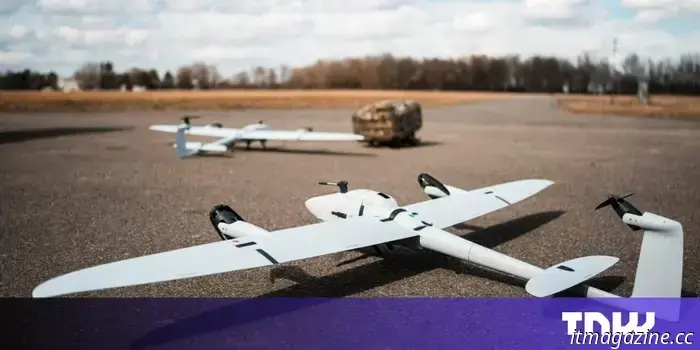
Exclusive: Latvian startup introduces autonomous drone eliminator.
Latvian startup Origin Robotics has introduced BLAZE, an autonomous interceptor drone aimed at neutralizing enemy drones through collision or detonation.
BLAZE can be deployed on the battlefield in under a minute and is packaged in a compact briefcase that serves as both a launchpad and a charging station.
Utilizing computer vision technology, BLAZE is trained to differentiate between various types of aircraft and to identify them amidst other objects, like birds. It integrates this capability with conventional radar to accurately track aerial targets.
Once it identifies an enemy unmanned aerial vehicle (UAV), BLAZE launches from the ground and speeds toward its target. Armed with a warhead, it crashes into the enemy drone, resulting in an explosion that destroys both itself and the adversary drone. Alternatively, it can self-detonate when approaching its target.
Although this might appear wasteful, each unit costs at least ten times less than the drones it is intended to intercept, as disclosed by Origin to TNW, without specifying the actual price.
While BLAZE operates autonomously, Origin assures that operators maintain oversight until the very last moment. The drone also features a “wave-off” function that allows it to return safely or self-destruct if necessary, aimed at minimizing the risk of friendly fire.
As drones transform modern warfare, Origin promotes BLAZE as a low-cost method for counteracting them, addressing the void between gun-based air defense systems and expensive missile interceptors.
“The demand for a system like BLAZE is urgent — it is propelled by ongoing real-world operational needs,” stated Agris Kipurs, CEO and co-founder of Origin Robotics, to TNW. He mentioned that the company intends to “support NATO armies throughout Europe.”
One potential buyer is the Ukrainian military, where small explosives-equipped UAVs have swiftly become a favored weapon against Russia. Origin’s primary drone, BEAK, is already in active service in Ukraine.
However, Ukraine is also challenged by a wave of Russian drones, compelling it to seek budget-friendly methods to counter these mass-produced aerial threats.
In just January 2025, Russia sent over 2,500 drones into Ukrainian airspace.
“We developed BLAZE specifically to tackle this threat — it is a fast, intelligent, and cost-efficient addition to current air defense systems,” Kipurs maintained.
“In asymmetric warfare, drones are relatively low-cost and widely used to overwhelm air defenses and hit targets both at the front lines and deep within enemy territory, making it difficult and expensive to respond effectively,” he elaborated.
Ukraine has increasingly turned to first-person view (FPV) interceptor drones to mitigate Russian UAV assaults. These piloted FPVs are essentially consumer drones fitted with explosives.
“Though innovative, this method is highly complex and not scalable,” Kipurs remarked. He added that relying on FPVs for interception “demands an extremely skilled pilot possessing extensive training and flight experience — skills that are rare, even among seasoned operators.”
Kipurs co-founded Origin in 2022 with Ilja Nevdahs. The company has secured over $9 million in funding thus far and has recently obtained an R&D contract from the Latvian Ministry of Defence, along with a grant from the European Defence Fund.
Defense technology is a central theme of the Assembly, an invite-only policy program at the TNW Conference. The event is scheduled in Amsterdam on June 19, just a week prior to the NATO Summit in the city.
Tickets for the TNW Conference are currently available — use code TNWXMEDIA2025 at checkout for an exclusive discount.
Other articles
 DoorDash acquires Deliveroo for £2.9 billion — which is less than half of its initial public offering price.
For Deliveroo, independence has come to an end. For DoorDash, it's a daring investment in the fragmented yet still-expanding food delivery sector in Europe.
DoorDash acquires Deliveroo for £2.9 billion — which is less than half of its initial public offering price.
For Deliveroo, independence has come to an end. For DoorDash, it's a daring investment in the fragmented yet still-expanding food delivery sector in Europe.
 Microsoft's latest Surface Pro is more compact, lighter, and enhanced for stylus use.
The latest 12-inch Surface Pro features a revamped design for Microsoft's tablet and keyboard, along with a more user-friendly stylus charging system.
Microsoft's latest Surface Pro is more compact, lighter, and enhanced for stylus use.
The latest 12-inch Surface Pro features a revamped design for Microsoft's tablet and keyboard, along with a more user-friendly stylus charging system.
 Keep your cool wherever you go: Enjoy a 10% discount on the TORRAS COOLiFY wearable air conditioner.
With Mother's Day approaching quickly (May 11, don't forget to mark your calendars) and the summer heat starting to set in, it's an ideal moment to surprise Mom with a gift that is both considerate and technologically advanced. The TORRAS COOLiFY is a personal neck fan that offers much more than just a gentle breeze. This stylish wearable air conditioner utilizes smart cooling technology [...]
Keep your cool wherever you go: Enjoy a 10% discount on the TORRAS COOLiFY wearable air conditioner.
With Mother's Day approaching quickly (May 11, don't forget to mark your calendars) and the summer heat starting to set in, it's an ideal moment to surprise Mom with a gift that is both considerate and technologically advanced. The TORRAS COOLiFY is a personal neck fan that offers much more than just a gentle breeze. This stylish wearable air conditioner utilizes smart cooling technology [...]
 German manufacturer of dual-use drones achieves unicorn status during defence technology surge.
German drone manufacturer Quantum Systems has secured €160 million at a valuation exceeding €1 billion, making it Europe’s newest defense technology unicorn.
German manufacturer of dual-use drones achieves unicorn status during defence technology surge.
German drone manufacturer Quantum Systems has secured €160 million at a valuation exceeding €1 billion, making it Europe’s newest defense technology unicorn.
 Apple reduces App Store fees, yet experts advise caution regarding new pricing guidelines in the U.S.
Apple's lowered App Store commissions are advantageous for consumers. However, experts are assessing whether it is genuinely beneficial for all parties involved.
Apple reduces App Store fees, yet experts advise caution regarding new pricing guidelines in the U.S.
Apple's lowered App Store commissions are advantageous for consumers. However, experts are assessing whether it is genuinely beneficial for all parties involved.
 NYT Connections: clues and solutions for Tuesday, May 6
Connections is the latest puzzle game from the New York Times, and it can be pretty challenging. If you require assistance in solving today's puzzle, we're here to support you.
NYT Connections: clues and solutions for Tuesday, May 6
Connections is the latest puzzle game from the New York Times, and it can be pretty challenging. If you require assistance in solving today's puzzle, we're here to support you.
Exclusive: Latvian startup introduces autonomous drone eliminator.
The Latvian startup Origin Robotics has introduced BLAZE, an AI-driven interceptor drone designed to autonomously seek out and eliminate enemy drones.
